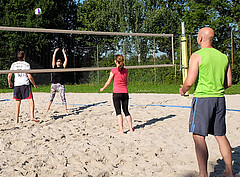Nutrition and Exercise
Studying in Lockdown [10.03.21]

In 2020, university sports were only allowed in the summer under strict hygiene conditions.
The Covid-19 pandemic containment measures are leading to major changes in everyone's daily lives. This is also true for students. Their daily lives are usually dominated by university events and activities. Social interaction, friendships, and social support have a significant impact on emotional well-being as well as academic success.
The altered daily routines due to the first lockdown in spring 2020, the effects of social isolation, and pandemic-related worries and fears may influence key lifestyle factors such as diet and exercise.
Overall, however, little data exists on this. However, initial research suggested that distancing and altered daily routines lead to less physical activity as well as changes in eating behaviors and body weight.
In order to gain insight into the extent to which the measures to curb the spread of Covid-19 actually affect the lives of students, the team of Prof. Nanette Ströbele-Benschop, Ph.D., from the Institute of Nutritional Medicine conducted an online survey among students at the University of Hohenheim after the first lockdown in summer 2020.
The researchers were particularly interested in changes in dietary and exercise patterns and any changes in body weight that might accompany them.
Less movement in everyday life, but more frequent sport activities
Prof. Ströbele-Benschop's team analyzed data from more than 800 students, most of whom were between 21 and 26 years old. As was to be expected due to the restricted university schedule and online-only courses, about half of the students reported that they exercised less in their daily lives under lockdown conditions.
"For us, however, it was also exciting in this context that there were students for whom sporting activities gained in importance instead of everyday exercise," reports Prof. Ströbele-Benschop. "Just over half of the students did more exercise than usual over the lockdown."
Serie: Corona & Folgen |
Die Corona-Pandemie hat bereits jetzt einschneidende Folgen: der Bildungssektor, die Wirtschaft, die Arbeitswelt allgemein, aber auch das menschliche Miteinander werden allerdings auch nach der Krise anders sein als vorher. Um damit umgehen zu können, sind wissenschaftliche Fakten wichtiger denn je. Auch zahlreiche Expertinnen/-en der Uni Hohenheim stehen mit ihrer Fachexpertise bereit. |
Often more vegetables and salad - but also hearty snacks, sweets, and cakes
In terms of consumption of individual food groups, half of the respondents reached for sweets and cakes more often than usual during the lockdown, some of which was reflected in body weight. The consumption of savory snacks and coffee also increased for one-third of the students.
On the other hand, one-third of all respondents reported eating more vegetables and salads and fewer meat products and cold cuts during the lockdown. In addition, more than 40 percent drank less alcohol than usual.
Weight changes in around half of respondents - 30 percent gained weight, 20 percent lost weight
Almost half of the students experienced a change in weight during the lockdown - both in a positive and negative sense. About 30 percent gained weight, while about 20 percent lost weight. It is interesting to note that students with a higher BMI were particularly affected by these weight fluctuations.
Notably, the group of students with a weight loss included significantly more (68 percent) who had increased their exercise during the lockdown than the group with a weight gain during the lockdown, in which only 37 percent increased their exercise.
"Overall, there appear to be very different strategies for how students respond to the lockdown," Prof. Ströbele-Benschop summarizes. "Some seem to be able to use the circumstances to their positive advantage and integrate nutrition and exercise more consciously into everyday life. For others, however, daily worries and loss of structure lead to further negative effects."
Strikingly, no differences were observed between genders. Thus, the lockdown seems to have a similar effect on the dietary and exercise behavior of female and male students.
Text: Stuhlemmer / Translation: Neudorfer